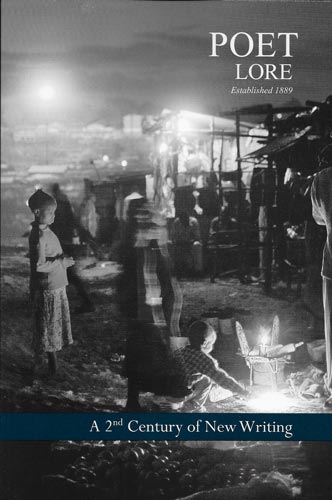Poet Lore – Fall/Winter 2016
“Home is the place where, when you have to go there, they have to take you in.” Robert Frost knew all too well that home is not always the place where one has chosen to be but is the place where one is, if not welcomed, at least allowed in. The poems in this issue of Poet Lore were meant to be together and fall under an umbrella theme of home; they deal with relationships of people and places inspired by or in reaction to the word home and all of its connotations. They explore the many manifestations of home in memories and observations tinged with bitter nostalgia, unapologetic and raw.
“Home is the place where, when you have to go there, they have to take you in.” Robert Frost knew all too well that home is not always the place where one has chosen to be but is the place where one is, if not welcomed, at least allowed in. The poems in this issue of Poet Lore were meant to be together and fall under an umbrella theme of home; they deal with relationships of people and places inspired by or in reaction to the word home and all of its connotations. They explore the many manifestations of home in memories and observations tinged with bitter nostalgia, unapologetic and raw.
The editors draw attention to Henry M. Seiden’s essay, “Home Thoughts” in which he “argues that the longing for home is a central theme in poetry and in therapy.” They attest that the poems in this issue reinforce this idea in a variety of ways, and after reading them, I agree. Each poem is an exploration, as if each poet has considered images and events and created an artistic expression of home and what it means or doesn’t mean and released it from attachments to sentiment and unburied whatever truths remain to expose.
Parental wisdom and influence are themes in a number of the poems in this issue, and the placement of poems dealing with relationships with fathers is effective in transporting the reader from everyday responsibility to a contemplative space in which fathers are considered for what they offer and what they lack. In James Crews’s “Halfway-Heaven” the speaker’s father is presented as someone who tried to teach through action and behavior, “the only language of manhood he knew,” which the speaker discarded for a different life with “the dust of books / and blue glow of computer screens.” The poem is a realization of how much the speaker misses his father and the details that he left behind in memory. In another poem, Judith Harris conveys how gazing at her father, “now at ninety-two,” brings a contentment while acknowledging “all those minutes and seconds, / still tearing us apart.” The bittersweet past and present mingle in realization of time’s passing and moments lost. In the following lines from Paul Martin’s “The Peach,” the father of the speaker teaches lessons of which he is unaware himself:
Without speaking he extended a slice
to me on his knife, and I tasted
such warm sweetness, tinged
with the taste of the blade.
Such richness of imagery finds a home in every poem in this issue.
Other poems in this issue recall sensations that hold meaning in relation to place. Brooke Sahni’s “Petrichor” affirms the sense of smell as a strong attachment to memory of place. She offers different ways to express the meaning of this word and tie them different scenes: “the nutty scent mounting from the ground; / leaves soused by November downpour”; “the smell of soil a plow turns up,” and “the sure swell of fragrance / after monsoon season—” each view place as something inseparable from the earth and from the poet’s recollection. The scent of Daphne flowers is remembered with the feeling of loss in Nora Hutton Shepard’s “No reason,” linking the scent with life and its absence with a search for answers. In this poem, death occurs for “no reason / anyone can name,” even if we know “it’s happened before.” In another contemplation of loss, sound rather than smell evokes memory, in José Angel Araguz’s “Music Box”:
and the sound rises, light
and lighter, then hangs
in the air, a smoke
made of the ash
of memory’s fire
The potent feeling of loss is infused in the stanzas of this and so many poems in this issue and it reverberates “like music recalled / soon as it’s silenced.”
The major section of poems ends with two from Naomi Shihab Nye coming just before her introduction of Jenny Browne and her poems “rich with definite cadences, deep curiosities, and multi-layered textures, voices, and personalities.” Nye’s poems in this issue, in keeping with the theme of home, also explore relationships, one between granddaughter and grandfather years after his death, and one between humans and time. The first poem, “Ring” is tinged with regret for a letter written by the speaker’s teenaged self who “wrote to him as if speaking to a dog,” and who “could not bear / his smallness.” “A ring with one black stone” is her symbol and reminder. In “Lonesome on the Earth,” Nye attempts to answer, “Why did we / feel so lonesome on the earth, in our own lives?” and concludes that the lonesomeness arises out of loss, something that “had gone missing in us now, some radiant gaze.” She ends with the idea that we may have had the answer to all life’s questions, but it has somehow been lost in the living.
I could write on and on about the rich quality of every poem in this issue of Poet Lore, and my best advice to any reader is to read it from beginning to end in one sitting, but slowly, like a hot cup of tea should be sipped and savored. I am ready for another cup.
[www.poetlore.com]





